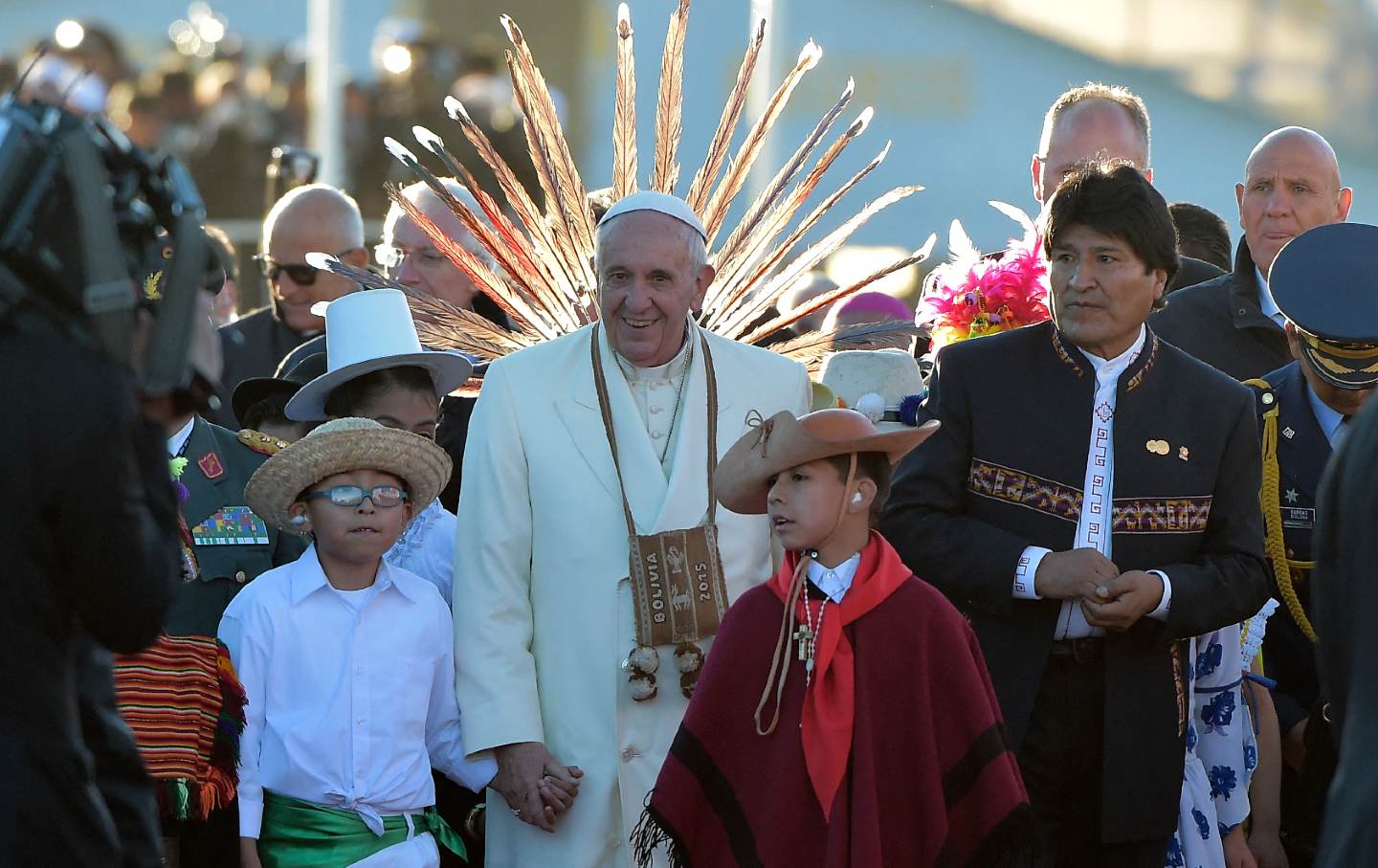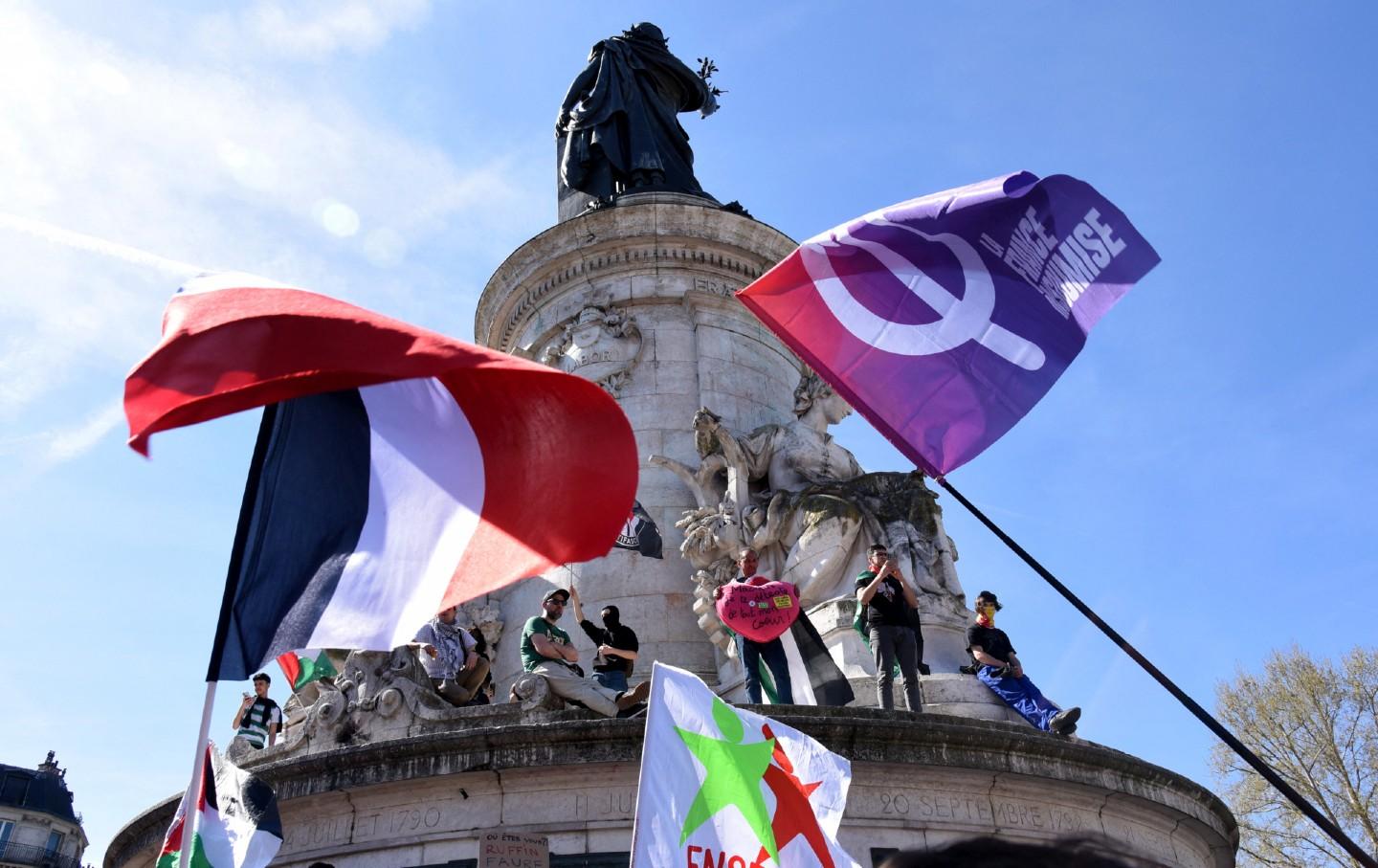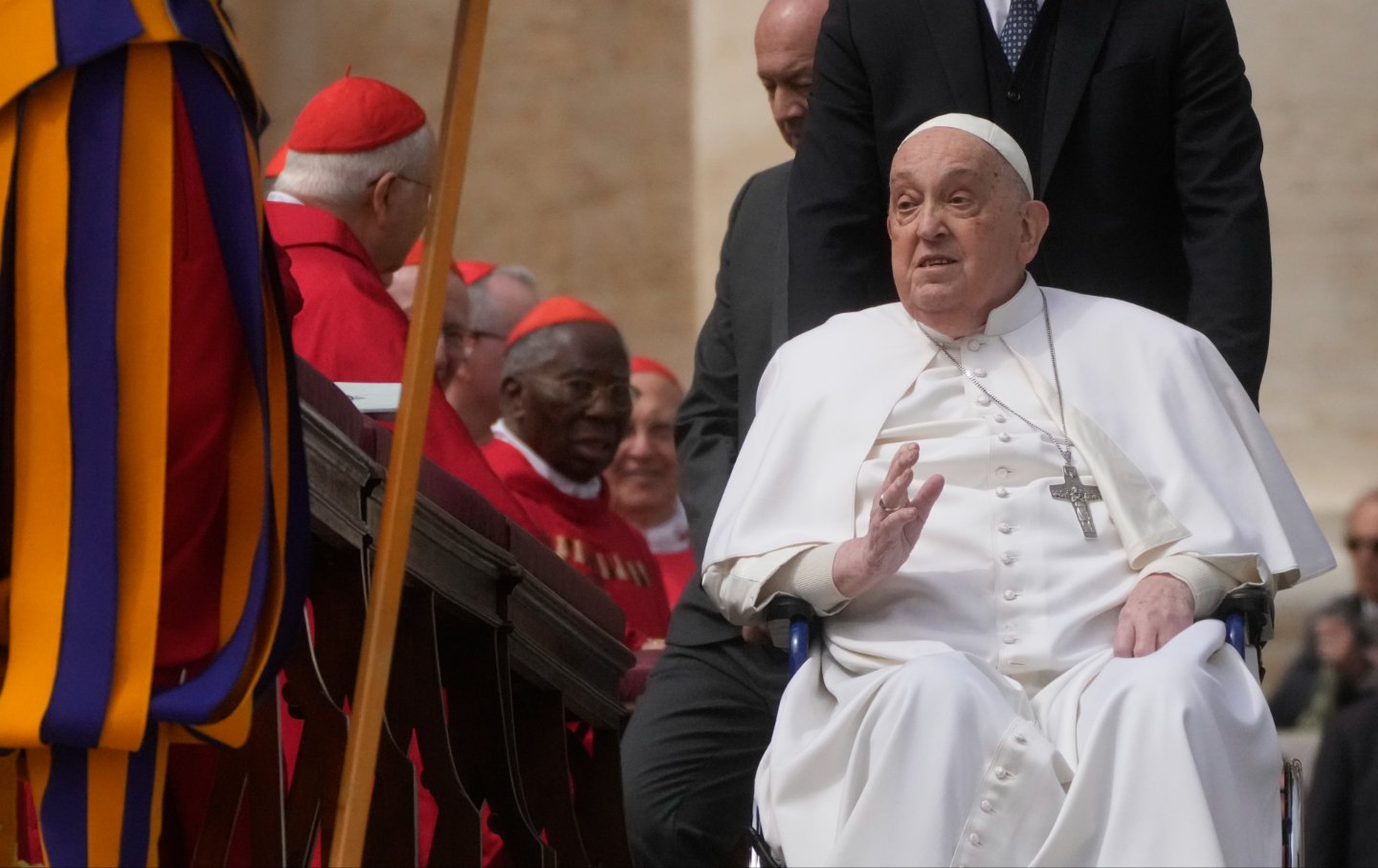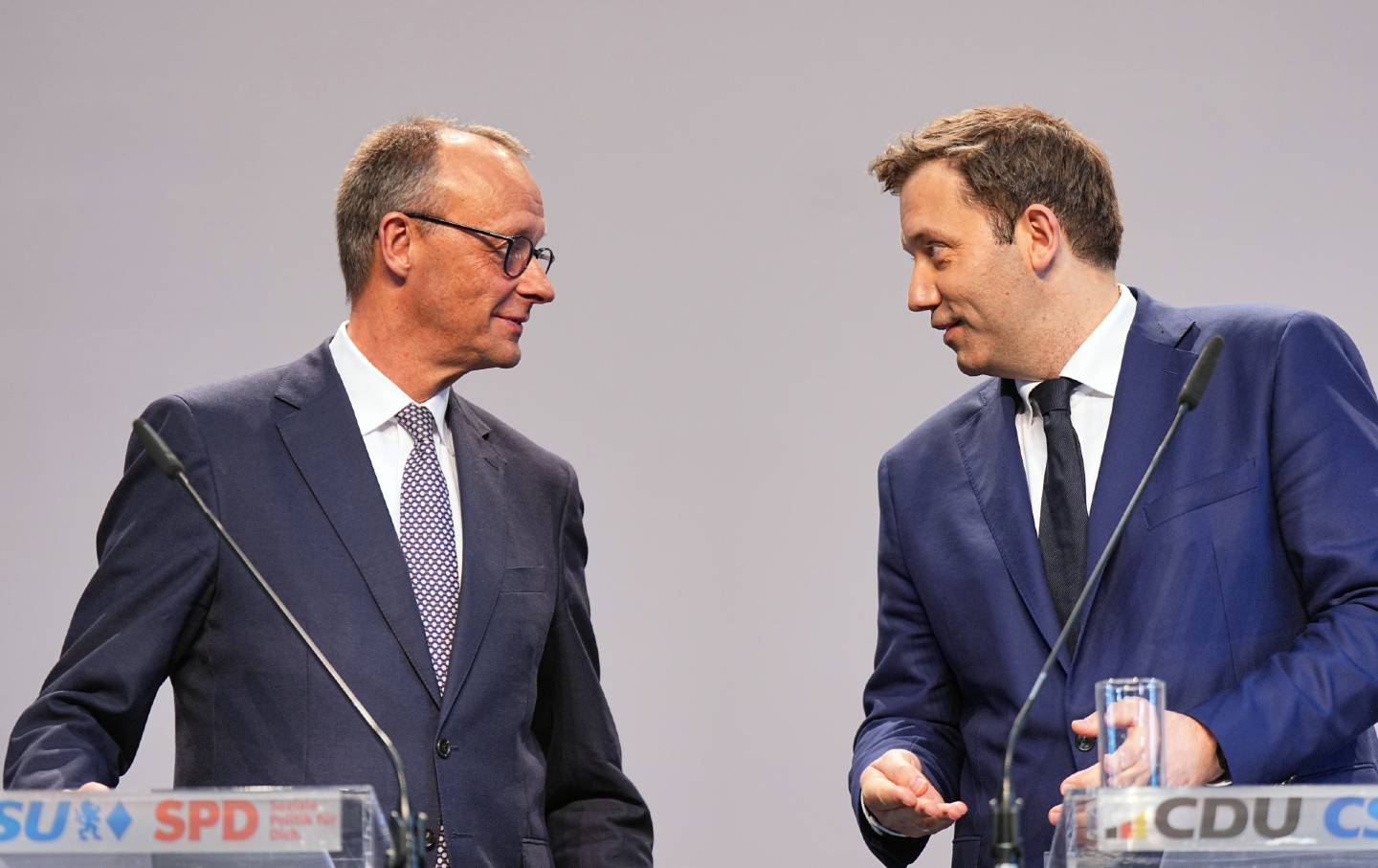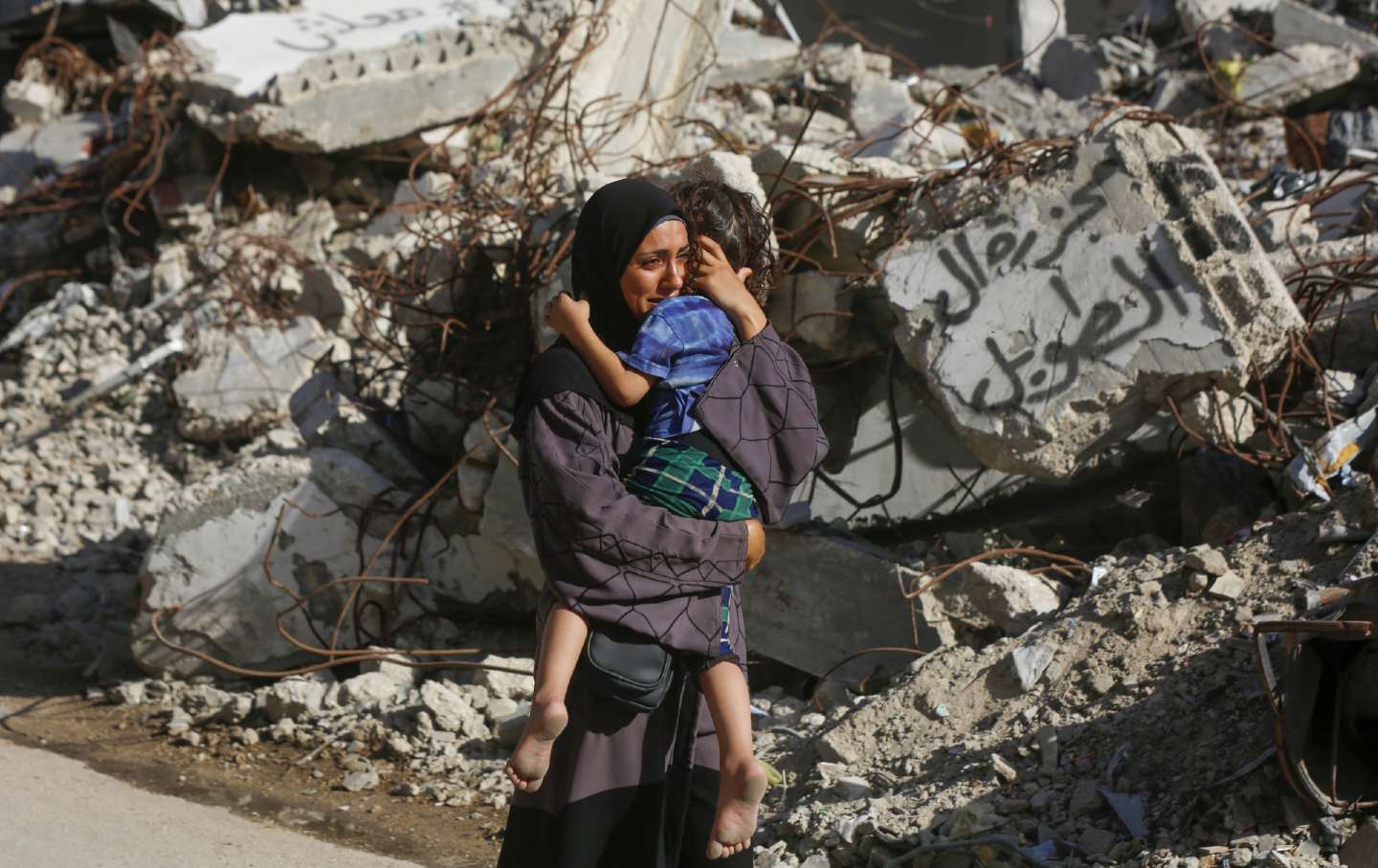Does the AKP’s Resounding Defeat Spell the End of Erdoğan?
Social democrats prevailed in local elections in Istanbul, and as Erdoğan himself says, “Whoever wins Istanbul wins Turkey.”
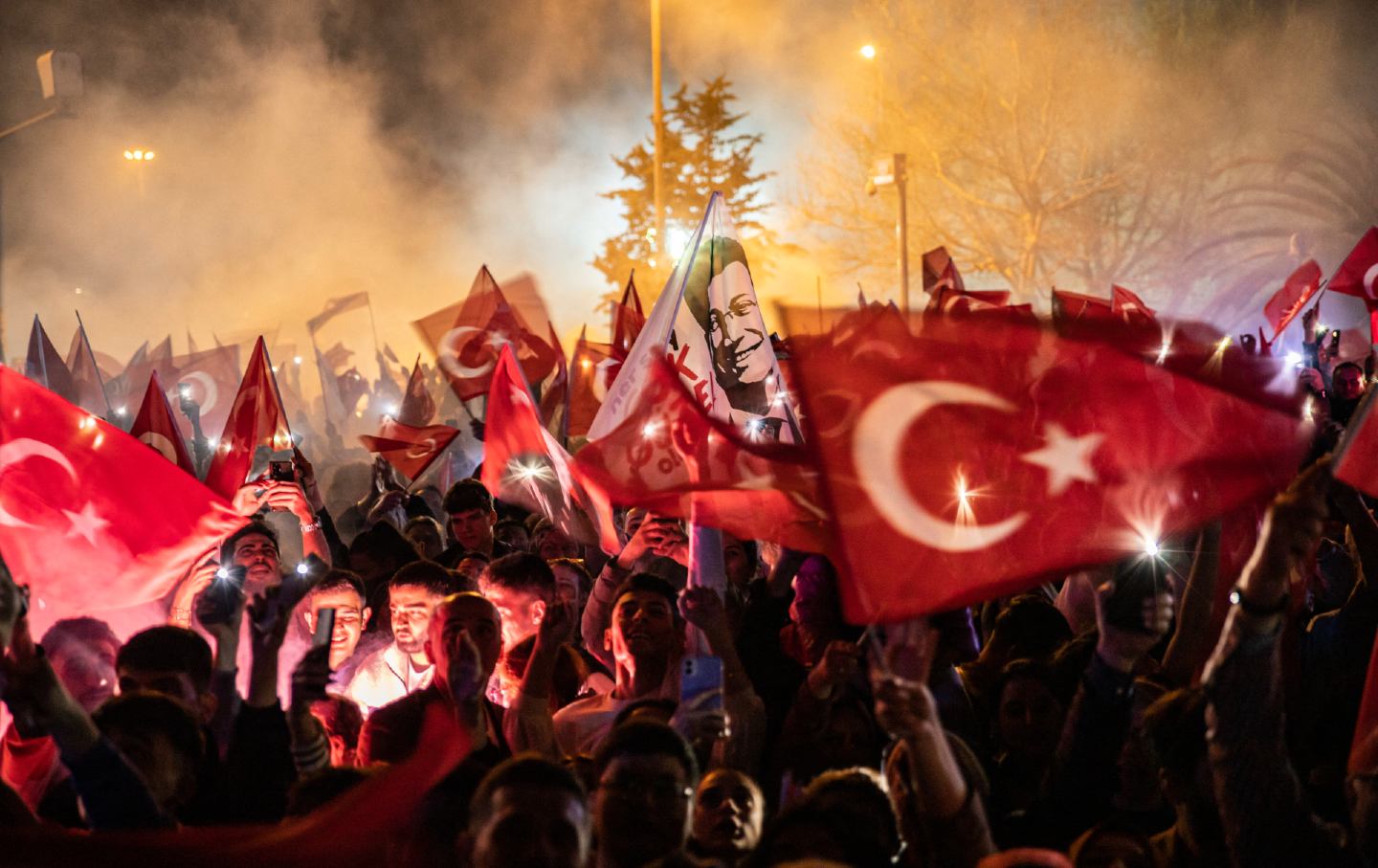
A crowd in Istanbul celebrates the election victory of Mayor Ekrem Imamoglu on March 31, 2024.
(Mert Can Bukulmez / Middle East Images / Middle East Images / AFP via Getty Images)When Gustave Flaubert visited Istanbul in 1850, the year he began writing Madame Bovary, he predicted that it would soon become “the capital of the world.” But after the collapse of the Ottoman Empire in 1922, Istanbul lost much of its significance in global politics, and Ankara became the new Turkish capital a year later. Yet the country’s most populous city continued to play the kingmaker role. Voters elected Recep Tayyip Erdoğan mayor in 1994, instigating his entry into national politics, where he became Turkey’s most consequential leader since the republic’s founder, Atatürk. On March 31, 2024, the night of Turkey’s local elections, Ekrem İmamoğlu, Istanbul’s incumbent mayor, seemed aware of Istanbul’s historical symbolism. In a speech that wouldn’t look out of place at a United Nations summit, İmamoğlu described March 31 as the “day the democratic erosion in Turkey ends, and democracy rears up,” and proclaimed that his win would usher Istanbul back to the center of world politics. “The disenchanted and repressed people who live under authoritarian regimes are watching Istanbul today,” he said in chirping tones, “Istanbul is guiding people who crave freedom and equality.” Calling the city “the guardian of democracy,” İmamoğlu christened people who voted for him “Istanbul’s guardians.”
Istanbul’s centrality will likely be Erdoğan’s political undoing, and the Turkish strongman knows it. Appearing alongside his wife on a balcony outside his residence in Istanbul on the night of his defeat, the tall, ailing autocrat resembled a man who just received a worrying health diagnosis. “This isn’t the end,” he said, “but a turning point.” That was rich for the leader of a party that received its biggest trashing since it was founded in 2001. The vote for the Justice and Development Party (AKP) dropped from 44.3 percent in the May 2023 elections to 35.48 percent; it lost 5 million votes when compared to 2019. Nationally, March 31 marks the most convincing victory since 1977 for İmamoğlu’s party, the Republican People’s Party (CHP), which Atatürk founded in 1923. The CHP hasn’t come in first in elections in a half a century. Turkey’s five biggest cities will now be run by social-democratic mayors.
“Whoever wins Istanbul wins Turkey” is a motto of Erdoğan’s that now haunts him. Around 16 million live in Istanbul, including the president himself, and the municipalities once run by the AKP, including the conservative Sancaktepe, Eyüp, and Bayrampaşa, now have CHP mayors. Social democrats even flipped Üsküdar, an AKP stronghold where Erdoğan resides.
What did we learn on March 31? That it made more sense for social democrats to act by and like themselves. In last year’s general elections, the CHP formed a coalition with disgruntled Islamists and a far-right party led by a former AKP founder known as Asena, or “the she-wolf,” for her extreme nationalist views. A few weeks before the May elections, while reporting a story for The Nation, I talked to the seasoned analyst Halil Karaveli, who told me that the CHP needed to embrace its leftism in the 1970s to win. The idea of the rainbow coalition, he predicted, would fail. I found Karaveli’s take pessimistic at the time. (Erdoğan triumphed with 52 percent in the May 2023 elections, receiving 2.29 million more votes than the CHP candidate.) Sunday’s elections proved him right.
Social democrats boasted about their socialist credentials this time. They seemed to have overcome their fear of alienating the “pious voter.” Turkey is experiencing one of the starkest economic crises of its history, and the AKP’s base can almost accept Trotskyism at this point. Erdoğan claims that he is an economist, but he lowered interest rates as inflation skyrocketed, which suggests he misunderstands how interest rates work. The official inflation rate soared to 67 percent in February 2024. (Unofficial data suggests that it is closer to 122 percent). Homelessness and hunger have become much more visible in Istanbul. Seeing older adults picking food from trash bins to survive is now routine.
Pensioners, whose numbers exceed 10 million, receive the equivalent of $312 each month; for those who pay rent, it’s impossible to reside in Istanbul with that amount of money. The city’s public parks and gardens are populated by retirees who complain about how the AKP has condemned them to hunger and poverty. In the May 2023 elections, Erdoğan was able to cushion such voters with government giveaways. Yet his minimum-wage increases and subsidies that were part of the AKP’s populist campaign last year came at a cost. His new finance minister, Mehmet Şimşek, has executed a program that realizes the urgent need to return to orthodox economic policies. In 10 months, interest rates rose from 8.5 to 50 percent. At the same time, the consequences of a deflationary economic program inevitably came to the surface. Erdoğan could no longer provide subsidies; during the campaign season, he refused to raise pensions from $312 to $624, which would result in more inflation and accelerate the collapse of the Turkish economy.
Erdoğan also refused to acknowledge citizens’ complaints of hunger. Şahin Tin, an AKP parliamentarian, has said the claims were exaggerated; people couldn’t be considered hungry if they could eat bread, he insisted. Leading figures of the AKP heightened their “anti-imperialist” rhetoric, arguing that a “superior mind” in the West was forcing Turkey to its knees. Embodying this narrative were the darkly dressed AKP apparatchiks who became the public face of Erdoğan’s campaign. Fancy unofficial cars with flashing emergency lights fill the streets of Istanbul each day. Ignoring traffic rules and embodying wealth amassed through their ties to Erdoğan, the party people (predominantly men) parrot AKP talking points while competing to get ahead in the ranks of a party that has more than 11 million members. The AKP higher-ups crave administrative posts in Turkish Airlines, the public banks Vakıfbank and Halk Bankası, and the national broadcaster, TRT. Smaller fry try their hand at local tenders offered by AKP municipalities, which they are about to find will no longer be available for them. Those AKP diehards have electioneered on Erdoğan’s ambiguous “all will be well in the second half of 2024” platform. No serious economist believed that, and voters didn’t buy it either. Inflation will likely soar in the coming months, with the Turkish currency sinking further. In the eyes of many, the AKP’s brand is irreversibly associated with corruption and cronyism.
Social democrats tackled the economic crisis differently. They came up with a flurry of welfare initiatives. In Istanbul, İmamoğlu’s municipality distributes eight liters of milk monthly to impoverished families, sells affordable bread at 3,000 locations, delivers 5,000 nutrition packages each day, finances the education of disadvantaged college students, provides sanity pads, and hands out 10,000 lira to women who have recently left women’s shelters.
The contrast between such social initiatives and the AKP’s neoliberal vision that requires membership in its patronage system became especially apparent during Ramadan, which began on March 11. In City Restaurants, run by social democrats, Istanbulites could buy a bowl of soup, a main course, some rice or pasta, some yoghurt or fruit, water, and bread for $1.25. İmamoğlu, which means “the son of an imam,” also made good use of his Islamic surname, warming former Erdoğan supporters to his candidacy. In numerous post-election interviews, pious voters thanked the “İmam” for his help in difficult times.
Erdoğan, meanwhile, made the mistake of mocking the milk initiative. His AKP apparatchiks imitated the strongman’s sarcastic, inhumane tone. They caricatured the CHP as a party plagued by childish ideas. The AKP’s mayoral candidate of Istanbul branded City Restaurants “an initiative designed to fool people,” and claimed that İmamoğlu was “only good enough to sell meatballs,” questioning his mayoral skills. “March 31 will mark the victory of meatball sellers and artisans,” was İmamoğlu’s witty response. Tradespeople make up 30 percent of the city, he reminded Erdoğan’s clueless candidate of choice.
Popular
“swipe left below to view more authors”Swipe →Still, four more years under Erdoğan lie ahead. Legally, Erdoğan can’t run in the 2028 presidential elections. Yet, in his Latin American–style presidencialismo regime, whatever Erdoğan says goes, and he can call for early elections, dissolve the parliament, and run again. This wouldn’t be surprising for a leader whose closest allies are Vladimir Putin in Russia, Nicolás Maduro in Venezuela, Ebrahim Raisi in Iran, and Viktor Orbán in Hungary. Among those autocrats, he is the most seasoned.
Erdoğan also retains several dirty tricks up his sleeve. Hours after the results were announced, Turkey’s regional election commission removed Abdullah Zeydan, a pro-Kurdish candidate who garnered more than 55 percent of the vote, from his mayoral role in Van near Turkey’s eastern border with Iran. The commission claimed that Zeydan was made “ineligible” for the mayoralty by a previous conviction and handed the mayoral seat to an AKP candidate who won 27 percent of the vote.
The bizarre move signaled Erdoğan’s determination to continue the kayyım (“government caretaker”) politics that has defined his reign since 2016. Appointing government caretakers to administrative posts that were held by elected politicians he deems “terrorists” is a tactic Erdoğan can continue to use, even in cities like Istanbul. This is why the CHP’s reaction to the Zeydan case earlier in the week was vital. Hours after the removal of the pro-Kurdish politician, İmamoğlu and other CHP leaders called the act a “coup.” CHP heavyweights rushed to Van in solidarity; tens of thousands marched on the streets throughout the week. On April 3, Turkey’s election authority reversed the decision, reinstating Zeydan. The event will remain a preview of what the AKP is capable of when unchallenged.
On April 4, İmamoğlu described the elections not as a “turning point,” Erdoğan’s term, but “a breaking point from which there would be no return.” After a quarter of a century of AKP rule, the Istanbulites tested life under a different regime and appeared to savor it. On Sunday, they announced that they had no regrets. Erdoğan and his party will likely find the results too traumatic to acknowledge. In survival mode, they may act increasingly recklessly. A reminder of the danger is the upcoming court case of İmamoğlu on April 25. Istanbul’s mayor faces up to seven years in prison on “corruption” charges. (In 2022, he was sentenced to two years, seven months, and 15 days in jail for “insulting the country’s top election officials.”) Such interferences in local politics proved costly for Erdoğan’s popularity. If Turkey’s strongman president chooses to punish Turkey’s electorate for making the wrong choice again, he may find his diminishing support sink even further. But given his increasingly erratic authoritarianism, does he even care anymore?
Hold the powerful to account by supporting The Nation
The chaos and cruelty of the Trump administration reaches new lows each week.
Trump’s catastrophic “Liberation Day” has wreaked havoc on the world economy and set up yet another constitutional crisis at home. Plainclothes officers continue to abduct university students off the streets. So-called “enemy aliens” are flown abroad to a mega prison against the orders of the courts. And Signalgate promises to be the first of many incompetence scandals that expose the brutal violence at the core of the American empire.
At a time when elite universities, powerful law firms, and influential media outlets are capitulating to Trump’s intimidation, The Nation is more determined than ever before to hold the powerful to account.
In just the last month, we’ve published reporting on how Trump outsources his mass deportation agenda to other countries, exposed the administration’s appeal to obscure laws to carry out its repressive agenda, and amplified the voices of brave student activists targeted by universities.
We also continue to tell the stories of those who fight back against Trump and Musk, whether on the streets in growing protest movements, in town halls across the country, or in critical state elections—like Wisconsin’s recent state Supreme Court race—that provide a model for resisting Trumpism and prove that Musk can’t buy our democracy.
This is the journalism that matters in 2025. But we can’t do this without you. As a reader-supported publication, we rely on the support of generous donors. Please, help make our essential independent journalism possible with a donation today.
In solidarity,
The Editors
The Nation

